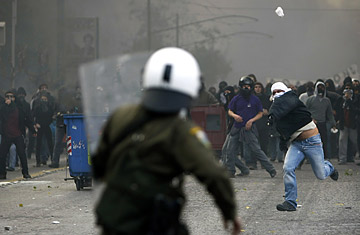
A protester throws a stone at policemen during riots in Athens.
For Athens police, the Exarchia neighborhood is enemy territory. A perennial sanctuary for the capital's marginalized far-left youth, the central district has been the scene of sporadic anti-government violence for years.
But clashes rarely grow as big as those that have wracked Greece for the past two days. They began when police shot dead a 15-year-old boy in Exarchia on the night of Saturday Dec. 6. That killing sparked riots that spread to at least a dozen towns and cities across the country and have so far left 67 people injured, including 37 police officers. Protesters have destroyed at least 17 banks and set fire to dozens of shops and cars. It is the worst political violence in Greece in 17 years. (See pictures of the riots in Greece.)
New clashes erupted Monday in several midsized cities, on the island of Corfu, and in Thessaloniki, Greece's second largest city, where youth overturned trashcans, set them on fire, and threw rocks at a police station. Further protests are planned though this week. Organizers hope they will remain non-violent, but police are preparing for more clashes.
The first signs of unrest came just hours after the killing of Andreas-Alexandros Grigoropoulos. Police say Grigoropoulos was among a gang of youths who attacked them while on patrol, though the exact circumstances of the incident remain unclear. The 37-year-old officer who shot Grigoropoulos says he fired warning shots to disperse a crowd, though witnesses charge that he pointed his gun at the young boy and discharged it once. Prosecutors have charged the officer with manslaughter, and his 31-year-old partner with abetting him. The coroner's report was inconclusive, though a ballistics test may determine whether the bullet was fired at Grigoropoulos directly or whether it ricocheted off something first.
In a letter to Giorgopoulos' family, Greek Prime Minister Costas Karamanlis expressed his condolences and assured them that such a tragedy "won't be repeated". Interior Minister Prokopis Pavlopoulos had earlier submitted his resignation, but Karamanlis has refused to accept it, as the fragile center-right government tries to avoid collapse under the weight of the riots. (See pictures of Greece ravaged by forest fires.)
The most aggressive rioters are believed to be anarchists, who trace their roots back to the resistance movement which took on Greece's military Junta between 1967 and 1974. Though democracy was restored to Greece in 1974, that earlier generation has continued to hold a fascination amongst the far-left fringe. Exarchia is close to the Polytechnic School of Athens, whose gates were crushed by the military to break up a student uprising in Nov. 1973. That incident inspired the Marxist terrorist outfit November 17, which killed 23 people in targeted assassinations before being dismantled in 2002.
The riots come as Greece's center-right government is struggling to cope with a plague of scandals and an economic slowdown that threaten its slim one-seat majority in Parliament. "For the past five years, Greek citizens have realized that they live in an insecure environment, both socially and financially," said center-left opposition leader George Papandreou. "We must address responsibly the deeper causes of these phenomena." (See pictures of the recent riots in Belgrade.)
Greece has experienced steady economic growth over the past seven years, but is now bracing for the fallout from the worldwide financial crisis. Many are angry that the government is giving $35 billion in aid to Greek banks at a time when one out of five citizens lives below the poverty line.
Political consultant Panagiotis Papachatzis says that this week's riots will further weaken Prime Minister Karamanlis. "Citizens feel there is a lack of decisive action by the government against all forms of violence — both police-induced and anarchist," says Papachatzis. "The social discontent of the past few days has placed itself [ahead] of the financial crisis."
